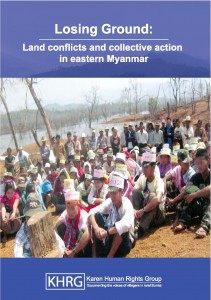Losing Ground: Land Conflicts and Collective Action in Eastern Myanmar
By Karen Human Rights Group • March 5, 2013 Analysis of KHRG’s field information gathered between January 2011 and November 2012 in seven geographic research areas in eastern Myanmar indicates that natural resource extraction and development projects undertaken or facilitated by civil and military State authorities, armed ethnic groups and private investors resulted in land confiscation and forced displacement, and were implemented without consulting, compensating or notifying project-affected communities. Exclusion from decision-making and displacement and barriers to land access present major obstacles to effective local-level response, while current legislation does not provide easily accessible mechanisms to allow their complaints to be heard. Despite this, villagers employ forms of collective action that provide viable avenues to gain representation, compensation and forestall expropriation. Key findings in this report were drawn based upon analysis of four trends, including: Lack of consultation; Land confiscation; Disputed compensation; and Development-induced displacement and resettlement, as well as four collective action strategies, including: Reporting to authorities; Organizing a committee or protest; Negotiation; and Non-compliance, and six consequences on communities, including: Negative impacts on livelihoods; Environmental impacts; Physical security threats; Forced labour and exploitative demands; Denial of access to humanitarian goods and services; and Migration.
Analysis of KHRG’s field information gathered between January 2011 and November 2012 in seven geographic research areas in eastern Myanmar indicates that natural resource extraction and development projects undertaken or facilitated by civil and military State authorities, armed ethnic groups and private investors resulted in land confiscation and forced displacement, and were implemented without consulting, compensating or notifying project-affected communities. Exclusion from decision-making and displacement and barriers to land access present major obstacles to effective local-level response, while current legislation does not provide easily accessible mechanisms to allow their complaints to be heard. Despite this, villagers employ forms of collective action that provide viable avenues to gain representation, compensation and forestall expropriation. Key findings in this report were drawn based upon analysis of four trends, including: Lack of consultation; Land confiscation; Disputed compensation; and Development-induced displacement and resettlement, as well as four collective action strategies, including: Reporting to authorities; Organizing a committee or protest; Negotiation; and Non-compliance, and six consequences on communities, including: Negative impacts on livelihoods; Environmental impacts; Physical security threats; Forced labour and exploitative demands; Denial of access to humanitarian goods and services; and Migration.
Download the full report in English, raw data testimony in English and report briefer in English and Burmese.
Tags: Displacement, Forced Labor, Karen Human Rights Group, Karen State, Land ConfiscationThis post is in: Business and Human Rights, Environmental and Economic Justice, Human Rights, Spotlight
Related PostsBurma Army Displays Blatant Disregard for 21st Century Panglong Peace Process
Karen State September 2016 Conflict: The Real Motivations Behind Renewed War
Burma Army’s actions in Karen State threaten to expand fighting, endangering peace process and displaced people’s return
Ann Din Coal Power Plant: Local Movement and Action to Preserve and Protect Natural Resources and Land: Mon IDP Report Case Study #4
Burma Army and Proxy Army Send IDP’s Running in Hpa-An district, Karen State









 All posts
All posts